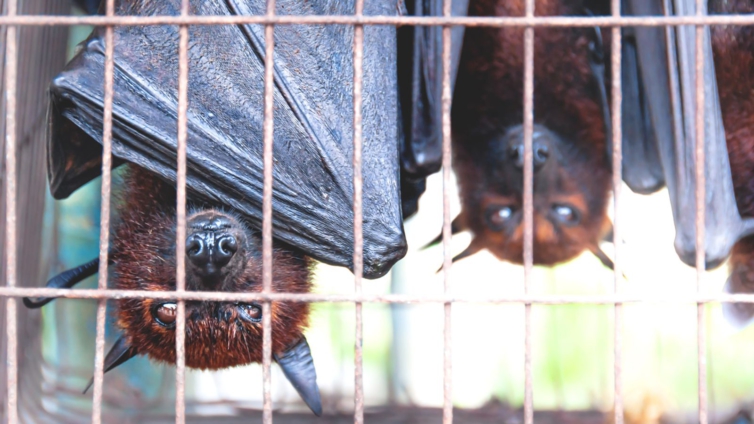The sale of live wild mammals at food markets should be suspended as an emergency measure, the World Health Organisation (WHO) has said.
The statement comes after a WHO team visited Wuhan in China to investigate the origins of Covid-19.
The most likely scenario is that the virus originated in bats, was spread to another unidentified animal, and then passed on to humans, a WHO report said in March.
The organisation said in a separate report on Tuesday that animals, "particularly wild animals", are the source of more than 70% of emerging infectious diseases in humans.
They added many of these are caused by novel viruses - a virus that has not previously been recorded.
The report states: "Wild mammals, in particular, pose a risk for the emergence of new diseases. They come into markets without any way to check if they carry dangerous viruses.
"There is a risk of direct transmission to humans from coming into contact with the saliva, blood, urine, mucus, faeces, or other body fluids of an infected animal, and an additional risk of picking up the infection from contact with areas where animals are housed in markets or objects or surfaces that could have been contaminated with such viruses."
The WHO said "traditional markets play a central role in providing food and livelihoods " around the world.
It added that banning the sale of live wild animals would help to protect the health of both shoppers and workers.
The closest-related viruses to Covid-19 have been found in bats in southwest China.
The intermediate host is more elusive: mink, pangolins, rabbits, raccoon dogs and domesticated cats have all been cited as a possibility.
The WHO team said that a theory the virus was leaked from a lab was "extremely unlikely" but it has not been ruled out.
The call for a ban on the sale of wild animals comes as the WHO said the global coronavirus pandemic is at a "critical point".
It added that people need a "reality check" as restrictions are eased.
Dr Maria van Kerkhove, head of the WHO's technical response, told a news conference vaccinations alone are not enough to combat Covid-19.
Coronavirus restrictions were eased in parts of the UK on Monday, with shoppers returning to high streets and drinkers visiting pub gardens in England, and non-essential retailers reopening in Wales.
Dr van Kerkhove, speaking on Monday afternoon, urged caution, saying: "We need headlines around these public health and social measures, we need headlines around the tools that we have right now that can prevent infections and save lives.
"We are in a critical point of the pandemic right now, the trajectory of this pandemic is growing."
Latest Stories
-
4-year-old cured leper walks again after Bawumia sponsored her special surgery
41 minutes -
Dorcas Affo-Toffey, earns dual Master’s Degrees in Energy, Sustainable Management, and Business Administration
60 minutes -
T-bills auction: Government got GH¢21.5bn in November 2024, lower than target
5 hours -
Ghana to return to single digit inflation in quarter one 2026
5 hours -
Panama’s president calls Trump’s Chinese canal claim ‘nonsense’
5 hours -
Manmohan Singh, Indian ex-PM and architect of economic reform, dies at 92
5 hours -
Government is not been fair to WAEC – Clement Apaak on delay to release WASSCE results
5 hours -
Bayer Leverkusen’s Jeremie Frimpong donates to Osu Children’s Home in Ghana
8 hours -
GPL 2024/25: Heart of Lions beat Young Apostles to go three points clear
9 hours -
Dance battles, musical chairs light up Joy FM Party in the Park
9 hours -
Kwabena Kwabena, Camidoh, Kwan Pa Band, others rock Joy FM Family Party in the Park
9 hours -
GPL 2024/2025: Aduana beat struggling Legon Cities
9 hours -
GPL 2024/25: Bechem United fail to honor match against Holy Stars
10 hours -
Cooking competition takes centrestage at Joy FM Family Party In The Park
10 hours -
Album review: ‘Wonder’ by Nana Fredua-Agyeman Jnr
12 hours

